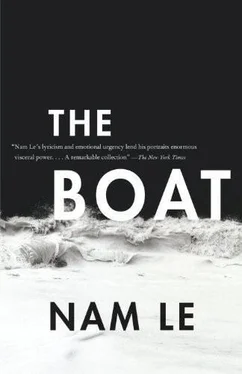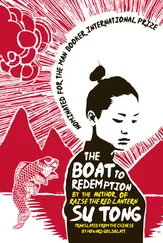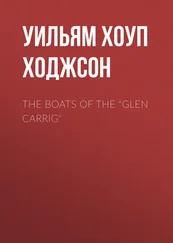He showed me. A skinny old man in Tantric poses, he looked faintly preposterous. During the auto he flinched, then, a smile springing to his face, asked me to help him to his foam mattress. I waited impatiently for him to stretch it out. He asked me again to help. Here, push here. A little harder . Then he went on talking, sometimes in a low voice, sometimes grinning. Other times he would blink — furiously, perplexedly. In spite of his Buddhist protestations, I imagined him locked in rage, turned around and forced every day to rewitness these atrocities of his past, helpless to act. But that was only my imagination. I had nothing to prove that he was not empty of all that now.
He told me how, upon his release after three years' incarceration, he organized our family's escape from Vietnam. This was 1979. He was twenty-five years old then, and my father.
When finally he fell asleep, his face warm from the Scotch, I watched him from the bedroom doorway. I was drunk. For a moment, watching him, I felt like I had drifted into dream too. For a moment I became my father, watching his sleeping son, reminded of what — for his son's sake — he had tried, unceasingly, to forget. A past larger than complaint, more perilous than memory. I shook myself conscious and went to my desk. I read my notes through once, carefully, all forty-five pages. I reread the draft of my story from two nights earlier. Then I put them both aside and started typing, never looking at them again.
Dawn came so gradually I didn't notice — until the beeping of a garbage truck — that outside the air was metallic blue and the ground was white. The top of the tin shed was white. The first snow had fallen.
***
HE WASN'T IN THE APARTMENT when I woke up. There was a note on the coffee table: I am going for a walk. I have taken your story to read . I sat outside, on the fire escape, with a tumbler of Scotch, waiting for him. Against the cold, I drank my whisky, letting it flow like a filament of warmth through my body. I had slept for only three hours and was too tired to feel anything but peace. The red geraniums on the landing of the opposite building were frosted over. I spied through my neighbors' windows and saw exactly nothing.
He would read it, with his book — learned English, and he would recognize himself in a new way. He would recognize me. He would see how powerful was his experience, how valuable his suffering — how I had made it speak for more than itself. He would be pleased with me.
I finished the Scotch. It was eleven-thirty and the sky was dark and gray-smeared. My story was due at midday. I put my gloves on, treaded carefully down the fire escape, and untangled my bike from the rack. He would be pleased with me. I rode around the block, up and down Summit Street, looking for a sign of my puffy jacket. The streets were empty. Most of the snow had melted, but an icy film covered the roads and I rode slowly. Eyes stinging and breath fogging in front of my mouth, I coasted toward downtown, across the College Green, the grass frozen so stiff it snapped beneath my bicycle wheels. Lights glowed dimly from behind the curtained windows of houses. On Washington Street, a sudden gust of wind ravaged the elm branches and unfastened their leaves, floating them down thick and slow and soundless.
I was halfway across the bridge when I saw him. I stopped. He was on the riverbank. I couldn't make out the face but it was he, short and small-headed in my bloated jacket. He stood with the tramp, both of them staring into the blazing gasoline drum. The smoke was thick, particulate. For a second I stopped breathing. I knew with sick certainty what he had done. The ashes, given body by the wind, floated away from me down the river. He patted the man on the shoulder, reached into his back pocket and slipped some money into those large, newly mittened hands. He started up the bank then, and saw me. I was so full of wanting I thought it would flood my heart. His hands were empty.
If I had known then what I knew later, I wouldn't have said the things I did. I wouldn't have told him he didn't understand — for clearly, he did. I wouldn't have told him that what he had done was unforgivable. That I wished he had never come, or that he was no father to me. But I hadn't known, and, as I waited, feeling the wind change, all I saw was a man coming toward me in a ridiculously oversized jacket, rubbing his black-sooted hands, stepping through the smoke with its flecks and flame-tinged eddies, who had destroyed himself, yet again, in my name. The river was behind him. The wind was full of acid. In the slow float of light I looked away, down at the river. On the brink of freezing, it gleamed in large, bulging blisters. The water, where it still moved, was black and braided. And it occurred to me then how it took hours, sometimes days, for the surface of a river to freeze over — to hold in its skin the perfect and crystalline world — and how that world could be shattered by a small stone dropped like a single syllable.
IN, LUIS SAYS, the beach is gray at dawn. He points to the barrel of his G3 when he says this, steel gray , he says. He smiles. The sand is white, he says, this color, tapping his teeth. And when the sun comes up on your right, man, it is a slow-motion explosion like in the movies, a big kerosene flash and then the water is sparkling gray and orange and red. Luis is full of shit, of course, but he can talk and it is true that he is the only one of our gallada who has seen the Caribbean. Who has been to Cartagena.
And the girls? Eduardo asks.
Luis tosses back his greasy black hair. He knows we will wait for his answer. He is the oldest of us (except for Claudia, who doesn't count because she is a girl), and he has told this story many times with pleasure.
The girls, he says. He looks at me and it is proper, he is showing respect. Together we smirk at the immaturity of Eduardo.
No, says Claudia. The fishermen. Tell us the part –
The girls, Luis says, speaking over Claudia, they are the best in all of Colombia. They wear skirts up to here, like on MTV, and boots up to here, and it is not like the country, where the autodefensas will shoot them for it. They are taller and whiter and have beautiful teeth and can talk about real things. Nothing like here.
He pauses. Luis has grown a mustache that looks like it has been drawn on with wet charcoal, and now he strokes it with his thumb and finger. I remember a line from a movie.
With that mustache, I say, you look like a shit-eating faggot. Eduardo laughs happily. And it is you who would be shot for your long hair.
Luis ignores me. He says, speaking slowly, In Cartagena, everything is nothing like here.
We are five, including Claudia, and we are going downtown to do some business on behalf of Luis. Apart from me and Luis and Claudia and Eduardo, there is little Pedro, who walks behind the group with his hands in his torn pants pockets in order to fondle his testicles. It is not even funny anymore.
I have not seen any of them, except for Claudia, in the last four months. Claudia — the only one who knows where I have been staying — told me yesterday about this business. I did not want to come but she told me how strongly Luis had insisted.
They look younger than I remember. Only Pedro has grown — he looks like he has been seized by a fistful of hair and stretched up two inches. I wait for him to reach me and say to him, Ay , you are almost a man now!
Ask him if he has any hair on his pipi , says Eduardo.
Pedro keeps his hands in his pockets and does not react.
See, even now he is molesting it!
Come on, says Luis. He sounds distracted. Claudia is smiling to herself. I look away from her.
Читать дальше











